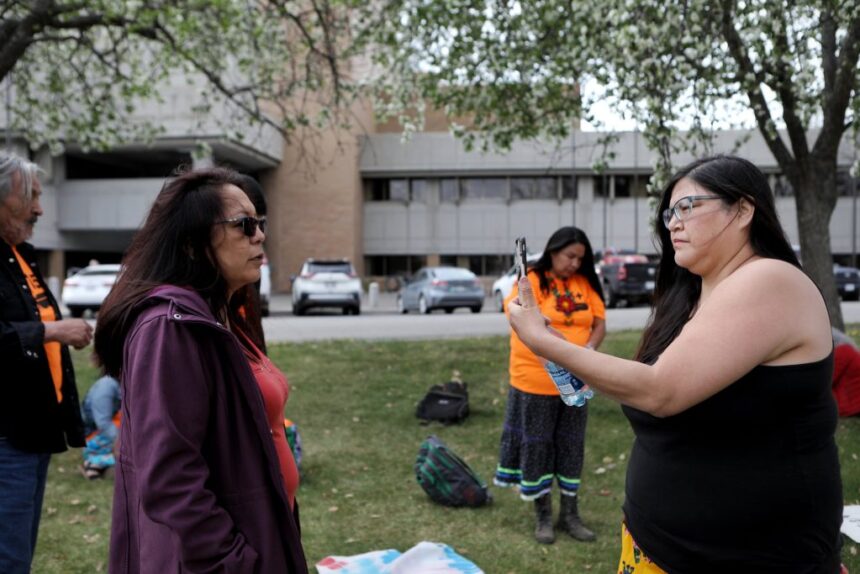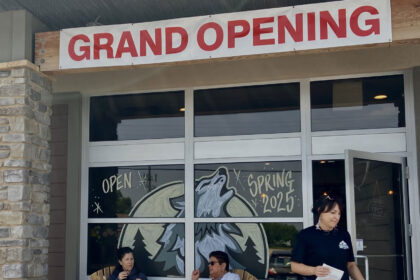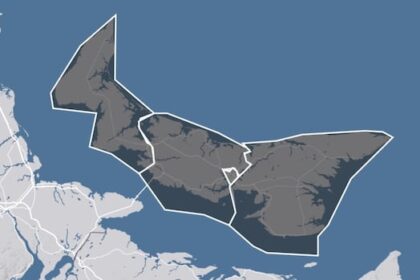The province’s highest court has denied a retrial for three people who opposed the pipeline’s development in Secwépemcúl’ecw Secwépemc Matriarch April Thomas, left, and Red Deer Billie Pierre of Nlaka’pamux Nation, conduct a livestream outside of the Kamloops Law Courts building in Tk’emlúps (Kamloops) on May 1, 2023, ahead of the first day of their sentencing hearing. The two were arrested and charged with criminal contempt for breaching a Trans Mountain Pipeline injunction-protected construction area in Secwepemcúl’ecw in October 2020. Photo by Aaron Hemens Three land defenders convicted in 2023 for their opposition to the Trans Mountain pipeline expansion (TMX) in Secwépemcúl’ecw have been denied a retrial, but say they intend to further escalate their appeal. On Friday, the provincial Court of Appeal dismissed attempts to overturn criminal contempt sentences for Secwépemc land defender April Thomas, Nlaka’pamux land defender Red Deer Billie Pierre and settler ally Romilly Cavanaugh. The decision by the province’s highest court comes more than four months after a lawyer for the trio argued that they were upholding Indigenous law when they were arrested for breaching a TMX construction area protected by an injunction three years earlier. Their lawyer argued that B.C. Supreme Court Justice Shelley Fitzpatrick — who tried and sentenced the land defenders in 2023 — had failed to ensure a fair trial and erred in several areas of law. However, in Friday’s decision, B.C. Court of Appeal Justice Lauri Ann Fenlon ruled Fitzpatrick “did not err” on any of the presented issues — including in Fitzpatrick’s rejection of the appellants’ “defence grounded in an honest belief that an Indigenous law gave them a right to enter the work site.” Fenlon said there is “no air of reality to such a defence” in cases where the accused are aware of a court order “prohibiting specific conduct” and nonetheless engages in a “public act of defiance,” the new decision reads. “At a minimum the accused in such cases is reckless as to whether the breach will depreciate the authority of the court.” Despite the Court of Appeal’s decision, Thomas said in a social media post that the trio intends to appeal their sentences to the Supreme Court of Canada and the International Criminal Court. “We have been arguing [Secwépemc law], so I think they are doing their best to not uphold our rights and our laws and trample us,” Thomas wrote. “We’ll fight to the end.” Judge concludes Indigenous law inapplicable In late 2020, police arrested Thomas, Pierre, Cavanaugh and five other land defenders who had been holding ceremonies near Secwepemcétkwe (South Thompson) in Sqeq’petsin (Mission Flats area). The arrestees were later charged with criminal contempt for breaching a TMX construction area protected by an injunction. Two years later, Fitzpatrick found the three guilty of criminal contempt for breaching the injunction. In early 2023, she sentenced Cavanaugh — a professional engineer who once worked for TMX — to 32 days in jail. Three months later, Thomas received the same punishment, while Pierre was sentenced to 40 days of house arrest. During their sentencing hearings, Thomas and Pierre argued they were upholding Secwépemc and Nlaka’pamux laws and duties to protect the water, salmon and land. But Fitzpatrick concluded this did not apply to their opposition of TMX. “Even accepting that Indigenous people generally have a duty and obligation to protect the land and water,” she said in her 2023 decision, “that does not mean that they have a duty to oppose Trans Mountain’s pipeline.” After community supporters raised funds for the defendants, all three filed appeals of Fitzpatrick’s sentences. Land defenders ‘failed to identify a particular Indigenous law’: judge Despite the appellants’ argument they they had a right to use Indigenous law in their original defence, the Court of Appeal said that the land defenders “failed to identify a particular Indigenous law they relied on to justify their contravention of the injunction.” Additionally, the court found no error in Fitzpatrick’s assessment of the mens rea (or “state of mind”) element in the case, when Fitzpatrick initially said the appellants “intentionally chose to breach the injunction rather than peacefully protest or challenge the injunction by legal means.” The Court of Appeal declared that this case proves court orders protect the legal interests of both Indigenous and non-Indigenous defendants, citing deals several First Nations within Secwépemc territories signed with the pipeline company. “The Secwépemc people entered into benefit agreements with Trans Mountain and want the project to proceed so that they can realize on the benefits they have contracted for,” said the Court of Appeal’s ruling. “It is not for individuals, Indigenous or otherwise, to impose their own views about land use on other Indigenous groups by force.” In March, Benjamin Isitt, counsel for the appellants, told a three-judge appeal panel that the appellants “believe they had legal duties in these circumstances,” he said, “arising from Secwépemc and Nlakaʼpamux laws to protect the sacred waters of the Thompson River — Simpcwétkwe [North Thompson] in Secwépemctsín — and the salmon people who relied on the health of the river to survive.” Isitt told the Court of Appeal the land defenders requested subpoenas during their trial – a court order requiring a person to testify — from several elected Secwépemc chiefs whose First Nations granted permits and approvals for TMX development. Fitzpatrick quashed the subpoenas after examining Thomas’s testimony in court earlier in 2022, Crown lawyer Lesley Ruzicka explained during the appeal hearing. If the chiefs had testified, Isitt speculated the appellants and other accused would have tried to contrast their evidence against their own knowledge of Secwépemc rights, title, and duties within their territory. “The appellants sought to demonstrate their honestly held beliefs regarding these legal obligations,” Isitt said, adding that those Secwépemc obligations shaped “their concerns regarding the chiefs’ conduct.” However, Ruzicka said that Thomas’s testimony did not speak to Indigenous law, but rather, “challenged the authority and the authorizations to Trans Mountain,” as well as “the jurisdiction of the court to grant the injunction and challenge the application of the injunction to these lands.” “By the time Justice Fitzpatrick got to the subpoena hearing, it was very clear what the issues were … [the appellents] challenge the jurisdiction of this court over them,” Ruzicka said. The Court of Appeal’s decision on Friday declared Fitzpatrick did not err in quashing those subpoenas, concluding any evidence the land defenders sought to gain from the elected chiefs’ testimonies “was not relevant and amounted to a collateral attack on the court order.” Isitt said his clients could have used that chiefs’ evidence to support their mens rea — or state-of-mind defence — that their intentions arose not from “contempt” for the court, but rather from what they saw as their legal duty to uphold Secwépemc and Nlaka’pamux laws. But the Court of Appeal said that “the fundamental problem” with this submission is that “it is a new argument raised for the first time on appeal.” “At the subpoena hearing, the appellants did not argue that the elected chiefs could provide evidence that would help the appellants prove an Indigenous law that contradicted the injunction,” states the court’s decision. Instead, the Court of Appeal recognized that the appellants sought evidence from the elected chiefs to establish that “the courts did not have jurisdiction over Secwépemc people on unceded territory; the appellants were only subject to Secwépemc law on Secwépemc territory; the elected chiefs who signed agreements with Trans Mountain did not have the consent of their members to do so and were giving away rights in violation of Indigenous rights and title; and the injunction did not apply on unceded territory.” “The judge quite correctly rejected the relevance of such evidence. It is well-established that, in the absence of a treaty, Indigenous persons are generally subject to the laws of Canada, including criminal laws, whether on or off reserve lands and whether or not the land is unceded,” the Court of Appeal’s ruling said. Lawyer argued injunction zone wasn’t clearly marked Isitt said during the appeal hearing that Fitzpatrick did not show a “reasonable level of assistance” to the self-represented defendants, and used a “very dismissive tone” towards them at times. He also said that the appellants didn’t receive adequate disclosure about their arraignments — court hearings when accused are told their criminal charges, and can plead guilty or not guilty — and whether adjournments were properly granted. Fitzpatrick acknowledged the defendants were representing themselves without lawyers, but said the court had helped them. “They have struggled to understand the procedures, despite the court assisting them throughout the matter,” she wrote in 2022. “However, the accused were well aware of the irrelevance of their arguments.” The Court of Appeal said in their decision that the appellants’ complaints “do not rise to the level of a miscarriage of justice and can be dealt with summarily.” “The appellants were not denied a fair trial, nor was the judge biased. She was managing complex proceedings with multiple scheduling issues. The judge also did not fail to provide adequate assistance to the self-represented appellants,” the decision reads. Isitt had also submitted that Fitzpatrick erred in finding the Crown had proved that the area where the offences were committed was a TMX worksite covered by the injunction. He argued that there was no signage, fencing, or markings indicating that the TMX work site was protected by an injunction. Appeal Court Justice Fenlon, however, agreed with the appellants that Fitzpatrick couldn’t rely on the appellants’ motivation for attending the site as an indicator of the area being a TMX site. But she did note that Fitzpatrick pointed to the numerous signage on gates and fences outlining that the area was TMX property. “Although it was not open to the judge to rely on the appellants’ motivation for attending the site to determine whether the site was covered by the injunction,” the Court of Appeal decision reads, “the judge’s factual findings that the site was within the injunction area and that the appellants were aware they were contravening the injunction are supported by the remaining evidence.”
Thursday, 5 Feb 2026
Canada – The Illusion
Search
Have an existing account?
Sign In
© 2022 Foxiz News Network. Ruby Design Company. All Rights Reserved.
You May also Like
- More News:
- history
- Standing Bear Network
- John Gonzalez
- ᐊᔭᐦᑊ ayahp — It happened
- Creation
- Beneath the Water
- Olympic gold medal
- Jim Thorpe
- type O blood
- the bringer of life
- Raven
- Wás’agi
- NoiseCat
- 'Sugarcane'
- The rivers still sing
- ᑲᓂᐸᐏᐟ ᒪᐢᑿ
- ᐅᑳᐤ okâw — We remember
- ᐊᓂᓈᐯᐃᐧᐣ aninâpêwin — Truth
- This is what it means to be human.
- Nokoma











